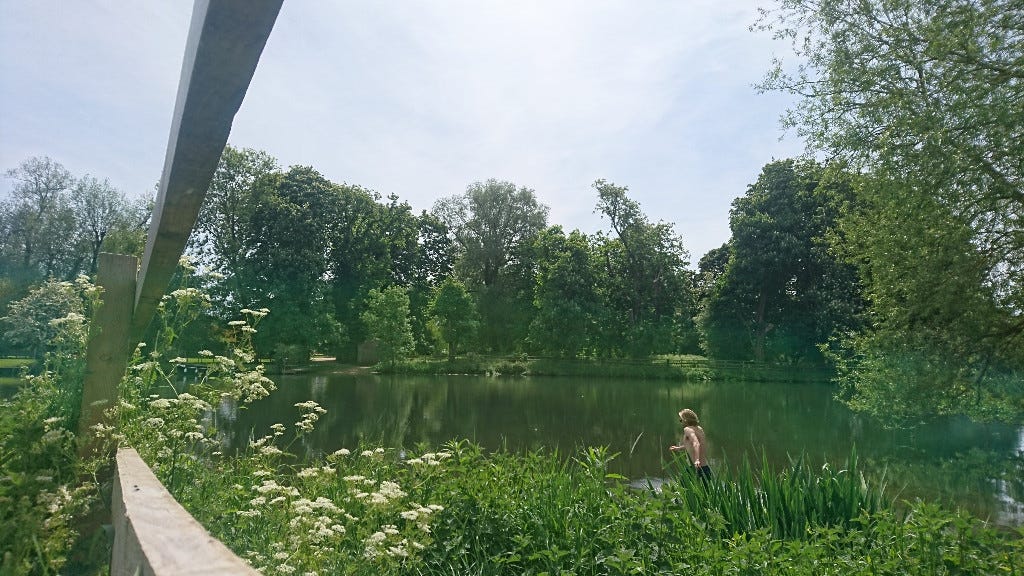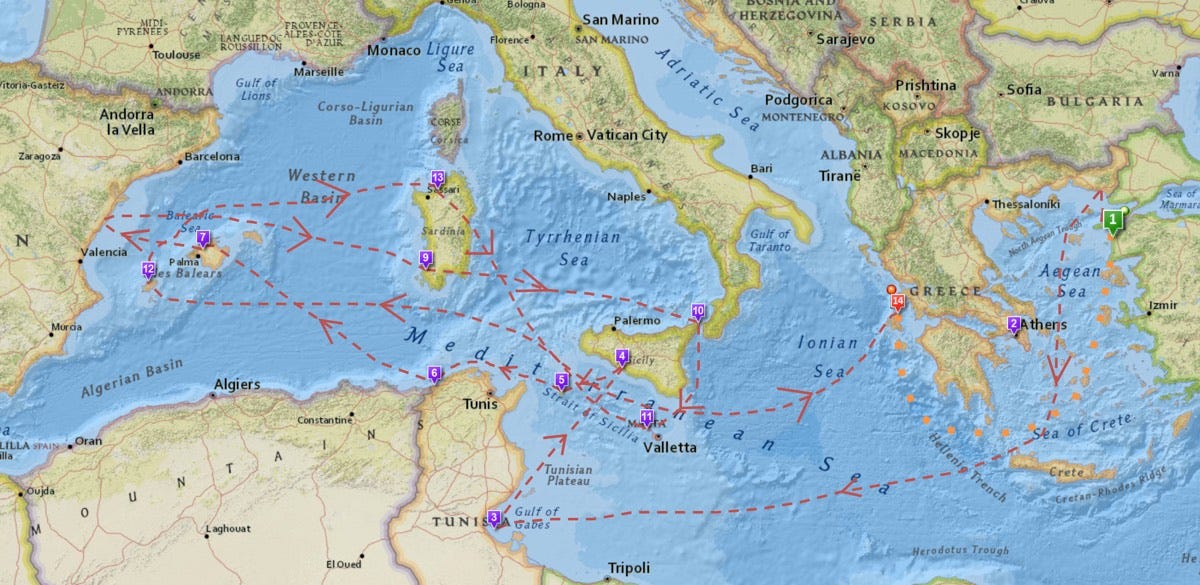#77: A day with a swim is always better than a day without a swim

Happy Friday!
I was undeterred by the sight of a gaggle of 'Run Doggy Run' dogs being hauled into the water for a splash. Not even after one particularly enthusiastic hound decided to urinate over some reeds.
I'm sure his pee is already thoroughly diluted. Besides: worse things have certainly oozed in that water unseen, but still. Slightly distasteful to actually witness the event.
There is something magical about the swimmer's view of the world. Instead of being on top of everything, you are 95% submerged. The banks rise up and the horizon stretches on forever as you gaze over your belly down stream.
The view inspires awe, as the panorama from a mountain top. Except instead of being high up you're as low as a human can go without the need for an aqualung.
There is traffic: two narrowboats wash past, one up, one down. But mostly my company are the flies that skate above the water, feeding on minute unseen winged creatures.
The water is cold at first, then cool. The current urges me back towards London and I have to fight to stay where I am. There's a metaphor buried somewhere beneath my frantic paddling.
The banks are bursting with colour, predominantly of the green shades. But there's also the butter of buttercups among the voracious white sprigs of cow parsley.
A day with a swim is always better than a day without a swim. Am I wrong? The sea often takes all the attention of swimmers in this country, but many more of us live near some other kind of water course.
It's out there now, gliding past but always there, waiting for you.
p.s. If you are cautious about cleanliness, then you can always look up your local watercourses on the Environment Agency Data Explorer. Where I swam rated 'Good' for chemical pollutants and 'Moderate' for ecological pollutants (high in copper - whatever that means).
GUTS!
The first major results of the British Gut Project are out and they're comfortingly unsurprising. One specific recommendation is that the healthiest guts were found in people who ate at least 30 different types of fruit and vegetable on a regular basis. This held true whether the subject was vegetarian, vegan or meat-devouring.
Further evidence, if any were needed, that the '5-a-day' mantra does not go far enough. It should be at least '5-different-a-day'. Now there's a challenge.
OUTPUT >>
As you may have noticed, this mailing list is the engine room of my blogging. Here's some you might have missed:
...COMING UP...
foiledfoiledfoiledfoiledfoiled
foiledfoiledfoiledfoiledfoiledfoiled
foiledfoiledfoiledfoiledfoiledfoiledfoiledfoiledfoiled
foiled
Now On: The Victor Frankl 5-a-day Book Club!
Membership Criteria: Read 5 pages a day of Man's Search for Meaning to complete the whole darn text in only 28 days. If you're pressed for time, try 3 pages a day of the central story: Experiences in a Concentration Camp. I'll be tootling through the text at just 5 pages a week, so you've got plenty of time to catch up.
Day 3, p22-26
These five pages begin with the first phase of the inmates mental reactions to life in a concentration camp. Unsurprisingly, the dominant symptom on admission to Auschwitz was shock.
There are three passages in today's reading that stand out for me. The first is Frankl's observation of the 'delusion of reprieve':
The condemned man, immediately before his execution, gets the illusion that he might be reprieved at the very last minute. We, too, clung to shreds of hope and believed to the last moment that it would not be so bad.
Needless to say, it was so bad. The very next passage describes the ghoulish absurdity of senior prisoners bargaining over a tie-pin made of platinum and diamonds when prisoners like Frankl were fed on a diet of only five-ounces (140g, ~5 slices) of bread a day.
On arrival at Auschwitz, the inmates were made to file past a senior SS officer who flicked his forefinger to the left or to the right, splitting the prisoners into two groups.
None of us had the slightest idea of the sinister meaning behind that little movement of a man's finger, pointing now to the right and now to the left, but far more frequently to the left. ... It was the first selection, the first verdict made on our existence of non-existence. For the great majority of our transport, about 90 per cent, it meant death. ... Those who were sent to the left were marched from the station straight to the crematorium.
Share your thoughts by replying to this email, or adding to the comments on my blog. We will continue next week...

A suggested itinerary for anyone hoping to travel in Odysseus's oarstrokes.
via Kottke.org
May you always swim against the current.
Much love,
- dc
CREDITS
David Charles wrote this. When not writing this, David co-writes BBC Radio sitcom Foiled, does copywriting for The Bike Project and the Elevate Festival, and volunteers for refugee youth club Young Roots. He is almost always available for work. davidcharles.info // @dcisbusy

Eddie Putera makes incredibly detailed scale models and miniature scenes, often of rusting and decaying things.
via Kottke.org


